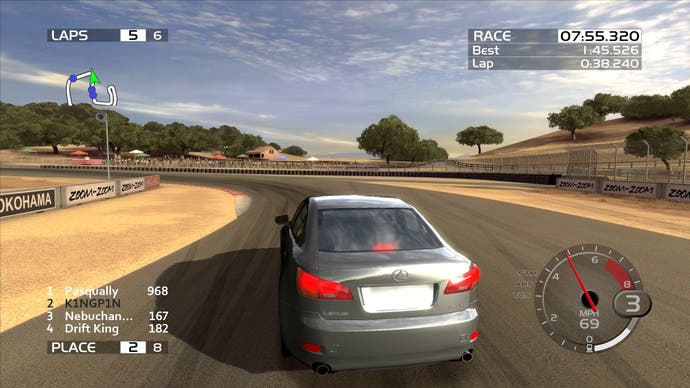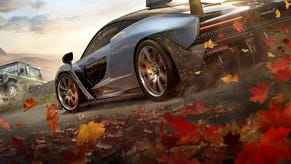Forza Motorsport 2
Turn 10 reclaims pole position.
Likewise Forza 2's approach to scaling difficulty is masterful for the more casual gamer. Before any race you are able to tweak certain difficulty modifiers such as making the AI more intelligent, toggling driving aids like the ingenious red braking line or switching damage from cosmetic to actual. The fewer aids you choose the more money you earn so there is real incentive to learn to play the game realistically, while scaling back the difficulty in later stages is as simple as accepting a per cent drop in winnings for the race. Indeed, for stages that are proving too hard or too long you can even hire an AI driver to race for you. It's a brilliant buy out for players who can't be bothered to tackle the very long courses but still want to play on through the game.
Money is not only key to purchasing new cars but also to buying upgrades for those cars. For the casual user there's no need to get into the nitty-gritty of tuning. Instead, each car is given a Class (starting from D) to indicate its performance level. On top of this every car is given a Performance Index (PI) number. The higher the car's index number the more powerful it is. When you buy upgrades to your car this index number increases and so the trick is to upgrade in such as way that you can squeeze as much power out of it without tipping it over into the next class. Souping a car up out of its class type is silly as most races limit entries based on class. Online you'll be able to see the PI of all of the other players' cars and this quick reference will give you an instant indication of whether you're going to be competitive or not thus removing a lot of the intimidation and confusion from the exercise.
Indeed, the community aspect of the game is incredibly well-handled and accessible. Car decals you've sweated over in the photoshop-esque Mario-Paint mode can be gifted to the world via an auction house - also viewable over the Internet. Likewise photographs you've taken in-game (you can also apply a wealth of tweaks to these such as aperture, white balance and contrast) can be uploaded to the Forza site mid-game (for posting on forums the next day) and with fully searchable race statistics the game integrates game and web with professional elegance not seen since Halo 2.

But despite all this slick excellence, and it is an extremely polished and professionally presented videogame, Forza 2 lacks a little personality. It's difficult to quite put your finger on but as the hours roll past there's an undeniable sense of sanitation, over-cleanliness and coldness within the game. Partly this is due to its mechanical nature: there are no characters or personalities to engage with here. Rather, all of your time is spent with machinery and, while admittedly lots of that machinery sports beautiful curves or, in the case of the older cars, perhaps holds warm nostalgic memories, it's still pretty hard to fall in love with.
Then again, when you count the number of men and women who fritter their weekends away in garages, or the teenage boys who accrue a small country's GDP worth of debt just so their Corsa can glow blue and hang low, maybe gamers like us are missing the point a bit. Mercifully, for those sitting on the fence, nervously weighing up whether Forza 2 is worth it to someone who doesn't swig petrol for elevenses, the racing is magical. It's a consistently tense, exciting and - if you use the Force Feedback Wheel which we absolutely urge you to do - very physical experience that comfortably overtakes PGR3.
Best of all you needn't have four interlinked TV screens and a bespoke racing chair to get the most out of this game - although that option is there for those who want it. Neither have you to spend hours under the bonnets, reading performance graphs or worrying about which spoiler is more likely to impress a girl and intimidate a boy. Forza 2 really is as universally appealing a sim racing game as one could hope for, and there's not a blue shell in sight.


